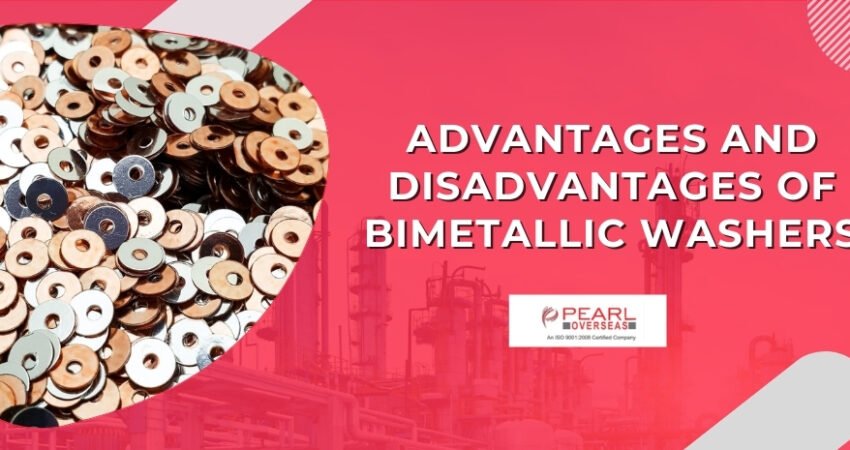
Understanding the Advantages and Disadvantages of Bimetallic Washers
Bimetallic Washers are special parts that are produced by fusing two metal materials to form a superior performance of higher strength and durability. A common use of residential materials is their application in industries with high thermal resistance, electrical conductivity, and corrosion resistance. The Advantages and Disadvantages of Bimetallic Washer are rated on the strength of its characteristics- to be cost-effective, balance loading better, and better stand up to harsh conditions, but with greater manufacturing complexities and a higher price. Their peculiar mixture of metals makes them suited to use in the automotive, electrical, and aerospace industries.
What are Bimetallic washers ?
A Bimetallic Washer is a special washer that is fabricated by joining two types of metals, typically copper and aluminum, to bring together the distinct characteristics of the metals. It also serves as a shielding contact when selecting dissimilar metals to avoid the occurrence of galvanic corrosion and enhance conductivity. These washers can find a common application in electrical, automotive, power generation, and industrial applications that require durability, conductivity, and corrosion resistance. They are long-term, reliable, and guarantee safe and efficient joints and connections.
How Do Bimetallic Washers Work?
Bimetallic Washers operate by bringing together two metals to take advantage of their individual characteristics, one being strong and the other being corrosion-resistant, thermal, or electrically resistant. The bonded metals spread out the pressure and can accommodate a change in temperature or stress, so they do not loosen or deform. By way of example, a steel-aluminum washer will require steel to be durable and aluminum to be more resistant to corrosion, hence it is suitable in automotive, electrical, and industrial applications.
What are the Properties of Bimetallic Washers ?
Bimetallic washers are designed to incorporate the characteristics of two other metals which are superior performance under challenging working conditions.
- High Corrosion Resistance : When a dissimilar metal is being joined, such as copper and aluminum, bimetallic washers are used to overcome the galvanic corrosion. This property guarantees that it is durable and reliable even when used in some severe industrial, marine, and outdoor environments.
- Excellent Conductivity : These washers are better electrically and thermally conducting, and they are also able to transfer current and heat efficiently between dissimilar metals. This qualifies them as an indispensable component in the generation of power, automotive, and renewable energy, where conductivity is of utmost importance.
- Mechanical Strength : Bimetallic washers have good mechanical properties, ensuring fastening and even distribution of loads. They can be used in construction, aerospace, and automotive manufacturing industries due to their ability to resist vibrations and heavy loads, as well as pressure.
Where are Bimetallic Washers Used?
Bimetallic washers are common in different industries because of their special strength and resistance to corrosion.
- Electrical Industry : Bimetallic washers are widely used in busbars, switchgear, and terminals to establish a connection between copper and aluminum. They inhibit galvanic corrosion, promote conductivity, and provide reliable power distribution, and are essential in contemporary electrical and industrial systems.
- Automotive Sector : Bimetallic washers are typical in the automotive industry in battery terminals, alternators, wiring assemblies, etc. They minimise resistance, increase durability, resist vibrations and temperature variation, and provide the operation of vehicles with stable electric contact and enhanced functionality.
- Power Generation : In generators and transformers, bimetallic washers are used to join dissimilar metals in power plants and substations. These washers reduce the energy loss, improve conductivity, and handle the continuous thermal and electrical stresses, which provide a stable and efficient flow of energy.
Advantages of Bimetallic Washers
Bimetallic washers provide good corrosion resistance, strength, and durability in extreme applications, and as points bellow.
- Enhanced Strength : Bimetallic washers are used, which is a combination of two metals, which is better in mechanical strength and durability as compared to the usual washers.
- Corrosion Resistance : A single metal layer is offered as protection against rust, chemicals, and other adverse weather conditions, and extends life.
- Thermal & Electrical Performance : Have the capacity to resist temperature changes and are also capable of conducting electricity effectively, thus being used in special purposes.
- Cost-Effective : A combination of metals saves on the cost of materials and does not affect performance and reliability.
Disadvantages of Bimetallic Washers
Bimetallic washers may also prove to be more costly and more difficult to produce, and galvanic corrosion may occur when used incorrectly, and as points below.
- Higher Cost : Unlike a single-metal washer, bimetallic washers are normally costly to manufacture, and their construction is elaborate.
- Manufacturing Complexity : Bimetallic washers are difficult, technical and time consuming to produce since they have a precise bonding of two metals.
- Thermal Expansion Issues : Bimetallic washers are not only hard, but also technical and time consuming to manufacture as they are characterized by an accuracy in bonding two metals.
- Reduced Flexibility : The flexibility of bimetallic washers may be less than bimetallic washers, and this may restrict their application in certain applications.
Choosing the Right Bimetallic Washer
- Identify the Application : Think over whether the washer will be applied in the automotive, electrical, chemical, or industrial conditions.
- Check Metal Compatibility : Make sure that the two metals in the washer are compatible with each other and other materials surrounding the washer to avert galvanic corrosion.
- Assess Load Requirements : Select a washer that is able to take the mechanical load, pressure, and stress unique to your application.
- Consider Environmental Conditions : Consider temperature variations, chemicals, moisture, or corrosive conditions during the choice of materials.
- Size and Dimensions : Make sure that the washer fits the bolt, nut, or assembly properly with clearance and with the correct thickness.
Conclusion :
The unique strength, durability, and corrosion resistance of bimetallic washers make them very valuable in industrial and mechanical use where great strength, longevity, and corrosion resistance are required. They are a favorite in all the automotive, electrical, and chemical industries due to their capability of performing under severe conditions and delivering dependable results. Yet these benefits are associated with some trade-offs, including increased costs, complexity in manufacturing, and galvanic corrosion, unless metals have been correctly chosen.
Have questions about Bimetallic Washers? Contact us anytime, you can send us a mail at export@pearlshims.com. We’re happy to provide guidance and help you choose the best options for your needs.

